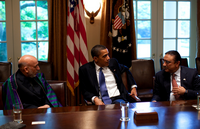With a variety of major political and military events unfolding across Asia and the Middle East, many countries are re-examining longstanding formal and informal partnerships and alliances. As a result, the coming months and years will bring about a recasting of important strategic links, some of which have been part of the global landscape for decades. The combined effect of America's war in Afghanistan, its fight against Muslim extremists inside Pakistan and the ongoing Arab uprisings are prompting a fundamental rethinking of some of the bilateral and multilateral ties that have served as the bedrock of international affairs in recent years.
Today, instability is the defining trait of the region spanning the greater Middle East and beyond, including North Africa and reaching across Iraq, Iran, Afghanistan and Pakistan. As long as the outcome of the Arab uprisings and their political aftermath remain unclear, no definitive changes to strategic alliances can yet be predicted with certainty for Arab countries. The same is true with the war in Afghanistan, which has had a powerful impact on Pakistan and its relations with the U.S. But old ties are already visibly frayed. And there is no shortage of efforts to find alternatives.
When the U.S. conducted the raid that killed Osama Bin Laden in Afghanistan last spring, it worsened an already acrimonious relationship with Islamabad, a key ally since Sept. 11. Immediately, Pakistan brandished the subtle threat that it might distance itself from Washington and move closer to Beijing. Back then, an anonymous Pakistani official told an American journalist that the Chinese were "very interested" in looking at the wreckage of a stealth U.S. helicopter that crashed in the operation. "We might let [them] take a look," he said suggestively.

